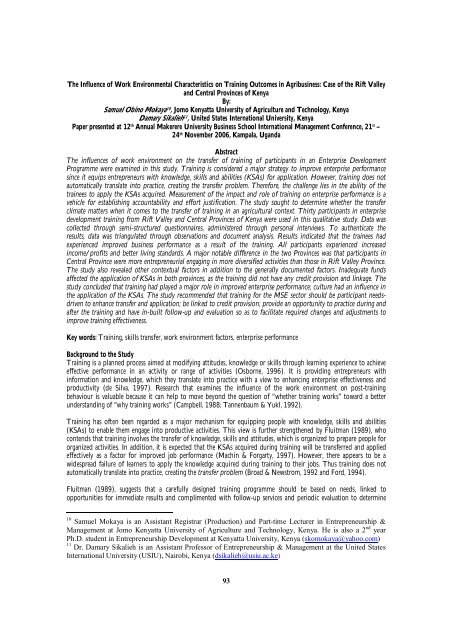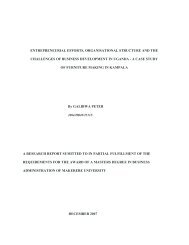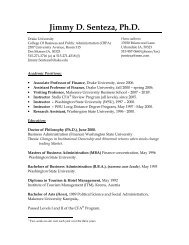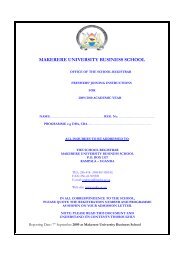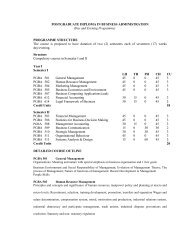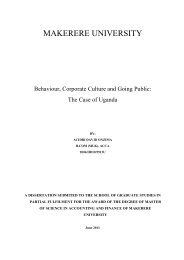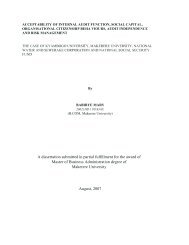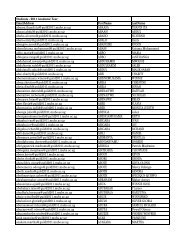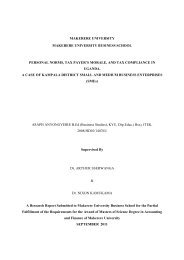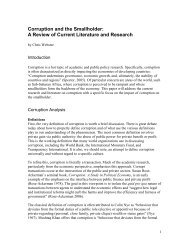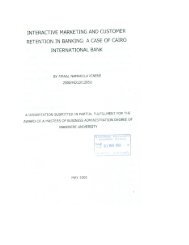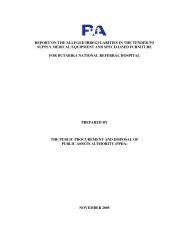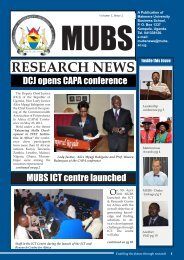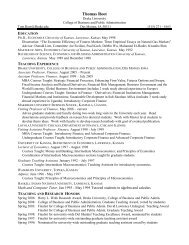13th Annual International Management Conference Proceeding
13th Annual International Management Conference Proceeding
13th Annual International Management Conference Proceeding
Create successful ePaper yourself
Turn your PDF publications into a flip-book with our unique Google optimized e-Paper software.
The Influence of Work Environmental Characteristics on Training Outcomes in Agribusiness: Case of the Rift Valley<br />
and Central Provinces of Kenya<br />
By:<br />
Samuel Obino Mokaya 10 , Jomo Kenyatta University of Agriculture and Technology, Kenya<br />
Damary Sikalieh 11 , United States <strong>International</strong> University, Kenya<br />
Paper presented at 12 th <strong>Annual</strong> Makerere University Business School <strong>International</strong> <strong>Management</strong> <strong>Conference</strong>, 21 st –<br />
24 th November 2006, Kampala, Uganda<br />
Abstract<br />
The influences of work environment on the transfer of training of participants in an Enterprise Development<br />
Programme were examined in this study. Training is considered a major strategy to improve enterprise performance<br />
since it equips entrepreneurs with knowledge, skills and abilities (KSAs) for application. However, training does not<br />
automatically translate into practice, creating the transfer problem. Therefore, the challenge lies in the ability of the<br />
trainees to apply the KSAs acquired. Measurement of the impact and role of training on enterprise performance is a<br />
vehicle for establishing accountability and effort justification. The study sought to determine whether the transfer<br />
climate matters when it comes to the transfer of training in an agricultural context. Thirty participants in enterprise<br />
development training from Rift Valley and Central Provinces of Kenya were used in this qualitative study. Data was<br />
collected through semi-structured questionnaires, administered through personal interviews. To authenticate the<br />
results, data was triangulated through observations and document analysis. Results indicated that the trainees had<br />
experienced improved business performance as a result of the training. All participants experienced increased<br />
income/profits and better living standards. A major notable difference in the two Provinces was that participants in<br />
Central Province were more entrepreneurial engaging in more diversified activities than those in Rift Valley Province.<br />
The study also revealed other contextual factors in addition to the generally documented factors. Inadequate funds<br />
affected the application of KSAs in both provinces, as the training did not have any credit provision and linkage. The<br />
study concluded that training had played a major role in improved enterprise performance; culture had an influence in<br />
the application of the KSAs. The study recommended that training for the MSE sector should be participant needsdriven<br />
to enhance transfer and application; be linked to credit provision; provide an opportunity to practice during and<br />
after the training and have in-built follow-up and evaluation so as to facilitate required changes and adjustments to<br />
improve training effectiveness.<br />
Key words: Training, skills transfer, work environment factors, enterprise performance<br />
Background to the Study<br />
Training is a planned process aimed at modifying attitudes, knowledge or skills through learning experience to achieve<br />
effective performance in an activity or range of activities (Osborne, 1996). It is providing entrepreneurs with<br />
information and knowledge, which they translate into practice with a view to enhancing enterprise effectiveness and<br />
productivity (de Silva, 1997). Research that examines the influence of the work environment on post-training<br />
behaviour is valuable because it can help to move beyond the question of “whether training works” toward a better<br />
understanding of “why training works” (Campbell, 1988; Tannenbaum & Yukl, 1992).<br />
Training has often been regarded as a major mechanism for equipping people with knowledge, skills and abilities<br />
(KSAs) to enable them engage into productive activities. This view is further strengthened by Fluitman (1989), who<br />
contends that training involves the transfer of knowledge, skills and attitudes, which is organized to prepare people for<br />
organized activities. In addition, it is expected that the KSAs acquired during training will be transferred and applied<br />
effectively as a factor for improved job performance (Machin & Forgarty, 1997). However, there appears to be a<br />
widespread failure of learners to apply the knowledge acquired during training to their jobs. Thus training does not<br />
automatically translate into practice, creating the transfer problem (Broad & Newstrom, 1992 and Ford, 1994).<br />
Fluitman (1989), suggests that a carefully designed training programme should be based on needs, linked to<br />
opportunities for immediate results and complimented with follow-up services and periodic evaluation to determine<br />
10 Samuel Mokaya is an Assistant Registrar (Production) and Part-time Lecturer in Entrepreneurship &<br />
<strong>Management</strong> at Jomo Kenyatta University of Agriculture and Technology, Kenya. He is also a 2 nd year<br />
Ph.D. student in Entrepreneurship Development at Kenyatta University, Kenya (skomokaya@yahoo.com)<br />
11 Dr. Damary Sikalieh is an Assistant Professor of Entrepreneurship & <strong>Management</strong> at the United States<br />
<strong>International</strong> University (USIU), Nairobi, Kenya (dsikalieh@usiu.ac.ke)<br />
93


